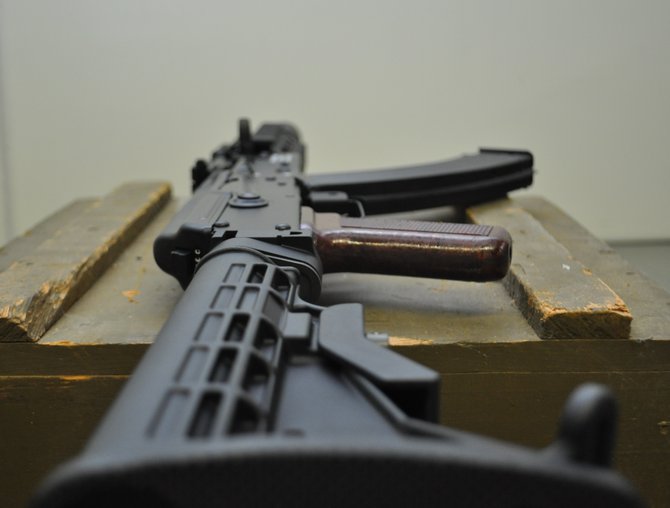We've taken a step back and laid out the best pieces we could find about guns. They're roughly organized by articles on rights, trafficking and regulation. Photo by Trip Burns.
This article, first published July 24, 2012, unfortunately seems relevant again. We've taken a step back and laid out the best pieces we could find about guns. They're roughly organized by articles on rights, trafficking and regulation. And include your suggestions in comments.
Gun Rights
Battleground America, New Yorker, April 2012 Jill Lepore's thorough look at the evolution of U.S. gun laws--from the Second Amendment, to the 1968 Gun Control Act, to the N.R.A.'s rise to political prominence--is an excellent primer for the modern day gun debate. And provides great context for the articles below. Contributed by @Corinneavital
Florida 'stand your ground' law yields some shocking outcomes depending on how law is applied, Tampa Bay Times, June 2012 The Tampa Bay Times analyzed nearly 200 "stand your ground" cases in Florida. Among the findings: Nearly 70 percent of defendants who invoke "stand your ground" went free. Seventy-three percent of those who killed a black person faced no penalty; 59 percent of those who killed a white went free.
Stand Your Ground Law Coincides With Jump in Justifiable-Homicides Cases, Washington Post, April 2012 Since Florida passed a Stand Your Ground law in 2005, more than 30 states have adopted similarly broad laws. Justifiable-homicide cases have also been on the rise nationwide.
Felons Finding It Easy to Regain Gun Rights, New York Times, November 2011 In many states the restoration of gun rights for convicted felons is now either automatic or left to the discretion of judges under vague standards. Standards are similarly lax for those with a history of mental illness--judges are often ill-equipped to make decisions without information about an applicant's mental health.
Trafficking
The Truth About the Fast and Furious Scandal, Fortune, June 2012 An investigation into the fallout over Operation Fast and Furious suggests much of what's been widely reported about the scandal is simply wrong. It doesn't seem the ATF intentionally allowed guns to fall into the hands of Mexican drug cartels. Based on confidential ATF documents and interviews with law enforcement agents, the piece claims the public charges are "replete with distortions, errors, partial truths, and even some outright lies." Fortune's follow-up answers some criticisms raised by Sen. Chuck Grassley, among others. Congress is conducting an investigation into Fast and Furious.
Realco Guns Tied to 2,500 Crimes in D.C. and Maryland, Washington Post, October 2010 As part of a larger look at firearms' paths from dealer to crime scene, the Post's analysis of gun-trace data for Virginia found that a handful of dealers sold the bulk of crime guns. Realco, the store featured in this piece, sold four times the number of crime guns as the next highest dealer. The kicker? It was all perfectly legal.
The Gun: The AK-47 and the evolution of war, CJ Chivers, October 2010 A nuanced, in-depth look at what is arguably the most lethal gun of all time.
U.S. Stymied as Guns Flow to Mexican Cartels, New York Times, April 2009 Before the ATF's efforts to monitor gun-trafficking across the U.S.-Mexico border became notorious, this article detailed how easy it was for straw purchasers to buy guns in the U.S. and get them across the border to Mexico, and how difficult it was for federal regulators to build a case against them. About 90 percent of the 12,000 guns recovered and traced in 2008 by Mexican officials came from U.S. dealers.
Regulation
Concealed gun law turns 10 years old, Booth Newspapers, June 2011 A decade after Michigan passed a law making it easier to get a permit to carry a concealed weapon, hundreds of thousands have been issued. This multi-part series shows how regulations meant to keep track of who has concealed-carry licenses--and whose should have been revoked--are a mess. The New York Times has also analyzed the lack of oversight into the concealed-carry permit process in North Carolina, which loosened the requirements to obtain such permits in 1995.
Ineffective rules let gun stores endure, Milwaukee Journal Sentinel, December 2010 The ATF is charged with inspecting the country's 62,000 licensed gun dealers. But it's rare for a permit to be revoked, and when it happens, stores often simply reopen with a new license in someone else's name, or sell guns on the side through their personal collections. (This Washington Post database lets you see which dealers near you have had their licenses revoked.)



Comments
Use the comment form below to begin a discussion about this content.